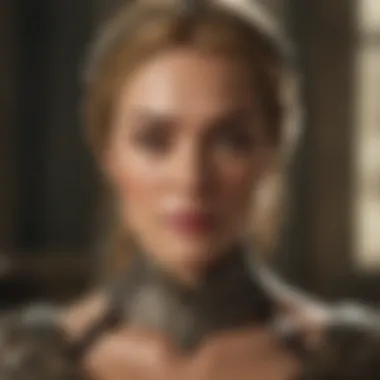The Profound Impact of Quotes in Game of Thrones


Intro
Game of Thrones has become much more than a mere television series. Its intricate blend of political intrigue, moral dilemmas, and rich characterizations has perfectly captured the attention of audiences worldwide. A notable aspect of this series is the impactful quotes that resonate within its narrative. These quotes not only shape character development but also encapsulate the deeper themes and philosophies of the storyline. By examining these lines, we can gain insights into the minds of the characters and how they reflect the greater moral complexities of their world.
Quotes in Game of Thrones serve as pivotal moments that crystallize the essence of the characters and their journey. They highlight themes of power, loyalty, sacrifice, and betrayal. As we explore the significance of these quotes, we will delve into specific characters, the events within episodes, the lore of Westeros, and even the speculations raised by fans. Through this lens, we aim to unveil the profound impact these words have on the audience and the enduring conversations they inspire within the fandom.
Prelude to Quotes in Game of Thrones
The significance of quotes in Game of Thrones transcends mere dialogue; they hold the power to encapsulate complex character motivations and themes within the narrative. This article will explore how specific quotes resonate profoundly with fans, shaping their understanding and interpretation of the series.
Quotes serve several essential functions in the storytelling process. They act as pivotal moments that reveal insights into character psychology and ethical dilemmas faced throughout the series. As such, they become more than just words; they mirror the struggles and triumphs of the individuals speaking them.
For instance, quotes can highlight character transformation. A character's statement at one stage can stand in stark contrast to another later on, illustrating growth, decay, or a fundamental change of perspective. Moreover, the emotions embedded within quotes can create a visceral bond between characters and the audience, fostering empathy or antagonism.
Beyond character insights, quotes often underscore key themes—such as power, loyalty, and fate. This dual function of quotes enriches the narrative texture of Game of Thrones, inviting viewers to engage more deeply with its philosophical dimensions. As fans reflect on these quotes, they find themselves engaged in larger questions about morality, governance, and the human condition.
Additionally, the impact of a well-crafted quote extends into the fan community, where they are frequently referenced and discussed. In this way, quotes become rallying points for fans, sparking debate and fostering a sense of shared identity among viewers.
To summarize, quotes in Game of Thrones are integral to both character development and thematic exploration. They enhance the viewer's experience by drawing them into the emotional and intellectual depths of the series, making their impact go beyond the screen and into discussions that shape the fandom's culture. As we proceed with this article, we will delve into how dialogue not only informs character arcs but also reflects the show's rich thematic landscape.
The Role of Dialogue in Character Development
Dialogue serves as a vehicle for emotion and motivation in Game of Thrones. It reveals the internal conflicts of characters and offers glimpses into their thoughts. The words spoken often hold more significance than simple plot advancement; they provide context for actions and decisions. Through dialogue, viewers gain insight into a character's motivations, desires, and fears, making it a crucial aspect in understanding their development.
Effective dialogue creates a connection between the character and the audience. It may illustrate their moral dilemmas or personal growth in a way that actions alone cannot achieve. Characters like Tyrion Lannister frequently use wit and eloquence to convey deeper truths about human nature, enhancing their complexity. This interplay between spoken words and character actions invites the audience to engage with the narrative on a more profound level.
The Nature of Dialogue
The nature of dialogue in Game of Thrones is multifaceted. It can be confrontational, diplomatic, or reflective, depending on the situation and characters involved. This range allows for a rich interaction between characters, often exposing layers of tension and alliance. For example, when characters such as Cersei Lannister engage in dialogue, it can be steeped in deception and manipulation, portraying the raw power dynamics at play.
In stark contrast, the dialogue between Jon Snow and his companions often embodies themes of honor and loyalty. This juxtaposition not only creates a dynamic narrative but also speaks to the larger themes of Game of Thrones as a series. Furthermore, dialogue in this universe does not merely serve to advance the plot; it often embodies the broader themes of conflict, power, and survival.
Character Arcs and Their Expressions
Character arcs, supported by dialogue, reveal the evolution of characters over time. In Game of Thrones, a character like Daenerys Targaryen transforms dramatically from a timid girl into a powerful leader. Her dialogue reflects her internal struggles and journey towards empowerment. Early on, her hesitation is apparent when she speaks, which later evolves into declarations of strength and determination.
Unlike Daenerys, characters like Jaime Lannister experience a journey of moral questioning. His dialogues between loyalty to family and desire for personal redemption showcase his character arc. Each conversation marks a shift in his persona, capturing the complexities of his character.
Overall, dialogue is an integral component of character development in Game of Thrones. It not only reveals who the characters are but also helps narrate their evolution. By mining these conversations, viewers can gain insight into the intricate artwork of storytelling that informs the very fabric of the series.
Analyzing Iconic Quotes
Analyzing iconic quotes is crucial to understanding the influence and impact of Game of Thrones as a narrative. These quotes serve as key expressions of character motivations, thematic depth, and moral complexities woven throughout the series. By examining them, we gain insight not only into individual characters but also into the broader narrative arcs they inhabit.
Each quote encapsulates pivotal moments that resonate strongly with viewers. They reflect the personalities of the characters, their dilemmas, and the overarching themes like power, loyalty, and fate. Furthermore, these memorable lines often act as cultural touchstones for fans, facilitating discussions and connections within the fandom.


The importance of iconic quotes extends beyond their surface meaning. They often reveal the moral ambiguity present in Game of Thrones, prompting viewers to reflect on their significance in real-world contexts. This analysis contributes to the understanding that the show is not just a tale of fantasy but a commentary on human nature.
"When the snows fall and the wind blows, the lone wolf dies, but the pack survives."
This quote, while succinct, opens up extensive discussions on themes of family, community, and survival. Analyzing quotes in this manner emphasizes their function as more than mere lines; they are vehicles for the deeper narratives that Game of Thrones presents.
Quotes from Jon Snow
Jon Snow's quotes often capture his struggle with identity and obligation. His famous line, "The things I do for love" showcases the conflicts he faces between duty and personal desires. This quote does not merely define Jon, it encapsulates the essence of sacrifice and the burdens him and others carry within the narrative.
Many of Jon’s reflections address leadership and honor. For instance, he once stated, "I am the sword in the darkness. I am the watcher on the walls." This quote emphasizes his role as a protector and highlights the weight of such responsibilities, making it a cornerstone for understanding his character arc.
Quotes from Daenerys Targaryen
Daenerys Targaryen's journey from a vulnerable exile to a commanding ruler is marked by powerful statements. "I will take what is mine, with fire and blood" illustrates her determination and the fierce approach she adopts in reclaiming her birthright. This attitude shapes her character, demonstrating her unwillingness to conform to the expectations placed upon her as a woman in a patriarchal society.
Another notable quote, "I am not a princess, I am a khaleesi," signifies her embrace of power and identity. This transformation reflects her evolution, drawing viewers into her fight for recognition and legitimacy. It also invites discussions on themes of gender and power in the universe of Game of Thrones.
Quotes from Tyrion Lannister
Tyrion Lannister’s wit and intelligence often surface in his quotes, offering both humor and sharp insights. One key line, "I drink and I know things," captures his character’s essence as an underestimated but astute player in the game of thrones. This quote resonates because it highlights the value of knowledge over brute strength, contrasting with the methods of other characters.
Moreover, his poignant reflection, "Never forget what you are. The rest of the world will not. Wear it like armor, and it can never be used to hurt you," speaks to the themes of identity and self-acceptance among the characters. Tyrion’s words often provide a deeper understanding of resilience amid prejudice, enhancing the series' exploration of personal struggles.
Analyzing these iconic quotes unveils the intricacies of Game of Thrones. Through the words of Jon, Daenerys, and Tyrion, the audience can engage with the complexities of the narrative, enriching their experience and understanding of the series.
Themes Reflected Through Quotes
The themes reflected through quotes in Game of Thrones offer profound insights into the emotional and philosophical landscape of the series. Quotes act not only as memorable lines but also as vessels carrying the show's core messages. The richness of these themes enhances the viewing experience for audiences, prompting them to engage in deeper contemplation of ethical dilemmas, human motivations, and societal structures. Each theme resonates strongly, revealing universal truths that impact viewers both within the context of the story and beyond.
Power and Its Consequences
Quotes about power expose its dual nature—both seductive and destructive. Characters like Cersei Lannister frequently articulate the harsh realities of wielding power. For instance, when she states, "When you play the game of thrones, you win or you die. There is no middle ground," it underscores the relentless nature of ambition and the personal cost associated with it. This captures how the desire for control can spiral into chaos.
Furthermore, the struggle for power leads to shocking events throughout the series, teaching viewers about the heavy toll of such pursuits. Quotes do not merely reflect the actions and consequences of characters; they also invite audiences to ponder the moral implications of power in their lives.
Loyalty and Betrayal
Every character's journey in the series is navigated through themes of loyalty and betrayal. The poignant quote from Jon Snow, "The things I do for love," highlights the depth of loyalty but is burdened by the betrayals that often follow. These reflections on loyalty reveal complex interpersonal relationships and the fragile nature of trust.
As characters make difficult choices, the motivations behind betrayal prompt viewers to question their own values and relationships. Game of Thrones effectively illustrates how loyalty can lead to tragedy when it clashes with personal ambition or survival instincts. This rich exploration encourages discussions among fans about their own definitions of loyalty.
Fate versus Free Will
Fate and free will are central to many quotes, representing the tension between destiny and choice. Tyrion Lannister famously quips, "I drink and I know things," suggesting his awareness of his fate but also his agency in shaping it. This duality resonates deeply within the narrative, fueling debates about whether characters are merely pawns of fate or masters of their own destinies.


Throughout the series, characters grapple with circumstances that test their will against what seems preordained. The quotes reflect on life's unpredictability, and this mindful exploration speaks to audiences navigating their own paths in a complex world.
Quotes from Game of Thrones provide a connection that goes beyond words. They embody ideas that provoke thought and inspire discussions around ethics and morality.
In summary, the examination of themes reflected through quotes not only enriches the narrative of Game of Thrones but also invites audiences to reflect on their own lives and choices. This engagement fosters a greater understanding of the intricate dance between power, loyalty, betrayal, fate, and free will.
Cultural Impact of Game of Thrones Quotes
The quotes from Game of Thrones serve as more than just memorable lines; they influence perceptions, inspire discussions, and resonate across various aspects of culture. Analyzing these quotes unveils their significance, shedding light on their role in shaping not only the series but also societal narratives. This section emphasizes the importance of evaluating how these quotes extend beyond the screen and weave into the fabric of everyday life.
Quotes in Game of Thrones often encapsulate vital themes and complex character dynamics. They spur discourse among fans and contribute to a shared cultural lexicon. Key quotes can be referenced in real-world contexts, indicating their broader relevance. By understanding the cultural impact, we appreciate how these lines echo in conversations and often depict moral and ethical dilemmas faced in society.
Influence on Popular Culture
The influence of Game of Thrones quotes on popular culture is profound. Iconic phrases have transcended the show, finding their way into everyday vernacular. Phrases like "Winter is coming" have been adopted to convey caution or anticipation in common dialogues. Their prominence in media and entertainment reflects the show's impact.
- References in Other Media: Numerous shows, movies, and books make allusions to quotes from Game of Thrones. This cross-referencing denotes its cultural significance.
- Merchandising: From mugs to t-shirts, quotes from the series are featured widely, underscoring their popularity and enduring legacy.
- Public Figures: Politicians, celebrities, and influencers frequently cite these quotes, adding a layer of respect and recognition.
The adoption of these quotes signifies their role in articulating complex ideas in a simplified manner, making them highly relatable and widely accepted.
Memes and Online Discussions
In the digital age, the birth of memes has further enhanced the cultural reach of Game of Thrones quotes. Memes often remix and reinterpret quotes, generating humor or poignant commentary on contemporary issues. They allow fans to engage creatively with the content and share insights within their communities.
- Social Media Trends: Platforms like Reddit and Facebook feature groups that discuss and create meme content based on famous quotes. This activity fosters a sense of belonging among fans.
- Discussion Threads: Online forums see in-depth analyses of quotes and their implications within the plot and real-world scenarios. Fans dissect not only the literal meanings but also the philosophical undercurrents in these lines.
"The game of thrones is about more than just power; it's about understanding the human condition and its complexities".
In summary, the cultural impact of quotes in Game of Thrones is significant. They are not just entertaining lines but serve as a mirror reflecting societal themes, moral questions, and shared experiences. Through online interactions and popular culture references, these quotes have secured a lasting legacy that continues to engage and challenge audiences.
The Philosophical Dimensions of Quotes
The philosophical dimensions of quotes in Game of Thrones extend far beyond mere entertainment. They act as a mirror reflecting the series' deeper ethical dilemmas and existential questions. The show often presents moral ambiguity, leaving viewers to confront difficult choices. Each quote can provoke thought and debate, tapping into complex themes around human nature, power, and conflict. This rich tapestry of ideas encourages audiences to critically engage with the narrative rather than passively consume it. As such, the quotes serve not only to enhance storytelling but also to invite dialogue about the human experience.
Moral Ambiguity
Moral ambiguity is a central theme in Game of Thrones. Characters often face choices that do not fit into clear categories of right or wrong. For instance, Tyrion Lannister's statement, "I drink and I know things," highlights his complex position in a world where knowledge and power are intertwined. It reflects his struggles with ethical dilemmas amidst a backdrop of harsh realities.
Important quotes showcase these moral conflicts, challenging the audience to consider the implications of each character’s decisions. The absence of absolute morality leads to a nuanced portrayal of character motivations. Verbal exchanges often reveal this complexity, as no character is entirely virtuous or villainous.
Here are a few examples of characters expressing moral ambiguity:
- Eddard Stark’s sense of honor contrasted with the brutal world.
- Daenerys Targaryen’s conflict between her desire for justice and her ruthlessness.
- Cersei Lannister’s cunning as a means of survival.
The quotes encapsulate their struggles, enhancing viewers’ understanding of their conflicting motivations and dilemmas. The show challenges us to ponder our own moral values and what we might be willing to sacrifice.


Human Nature and Conflict
Human nature and the nature of conflict are prevalent throughout the series. Quotes illustrate how fear, ambition, and survival instincts shape actions. In a world rife with betrayal and shifting alliances, the quotes often highlight fundamental aspects of humanity. For example, Littlefinger’s advice that "chaos isn’t a pit; chaos is a ladder" encapsulates the manipulative strategies characters employ to navigate uncertainty.
This exploration of human nature is vital to understanding conflicts within the story. Here are several key points:
- Characters are driven by desires that lead to inevitable clashes.
- Motivations often stem from deeply rooted emotional needs, such as love, revenge, or the will to power.
- Audience members are forced to confront uncomfortable truths about their own motivations and societal structures.
"When the snows fall and the white winds blow, the lone wolf dies but the pack survives." – Eddard Stark, emphasizing the complex interplay between individuality and communal ties.
In summary, quotes that deal with moral ambiguity and human nature significantly enrich the Game of Thrones narrative. They not only enhance character depth but also provoke introspection regarding ethics, relationships, and the constant struggle for power. Through each quote, the series invites an exploration of philosophy and the complexities surrounding human existence.
The Role of Quotes in Fandom
Quotes from Game of Thrones serve more than just narrative purposes; they unite fans and cultivate a deeper connection with the series. Through memorable lines, viewers find common ground and shared experiences. Quotes selected by fans often reflect personal philosophies, aspirations, or insights about life. In many ways, these lines have created a lexicon for the fandom, fostering a community built on mutual understanding and appreciation.
The significance of quotes in fandom extends beyond entertainment. It allows fans to express their emotions and beliefs. For some, quoting a line from Tyrion Lannister or Jon Snow can become a rallying cry or a source of motivation. This communicative function of quotes brings together individuals from diverse backgrounds, creating a sense of belonging.
Furthermore, quotes play a crucial role in how fans engage with the Game of Thrones universe. They interpret and analyze dialogue, leading to discussions that can reshape personal views or fan theories. In essence, quotes foster engagement, encourage dialogue, and inspire creativity within the community.
Quotes as Rallying Points
Quotes from Game of Thrones often serve as rallying points for fandom. When moments in the series resonate, fans draw upon these lines to express solidarity or support during real-life situations. Phrases like "Winter is Coming" have evolved into powerful reminders of resilience in the face of challenges. In this way, certain quotes transcend the screen.
These rallying points manifest in various forms:
- Social Media: Platforms like Twitter and Facebook become spaces for sharing favorite quotes, reflecting their meanings, and how they relate to everyday life. Fans often create memes or art based on these quotes, which further amplifies their impact across the online community.
- Conventions and Gatherings: At conventions, fans often chant or quote lines aloud. This creates a lively atmosphere, as individuals come together to celebrate their shared love for the series.
- Merchandise: Marketers have recognized popular quotes, leading to a range of merchandise that features these lines—t-shirts, mugs, and more. Such items solidify the connection many fans have with the series and the themes it represents.
Fan Theories and Interpretations
Fans often engage deeply with the content of Game of Thrones, leading to diverse interpretations and theories stemming from specific quotes. These theories illustrate a desire to make sense of complexities in character motivations and overarching narratives.
- Analysis of Character Intentions: A quote may spark a heated debate among fans regarding a character’s true motivations. For example, when Tyrion states, "I drink and I know things," it invites exploration into his strategic mind and personal battles.
- Exploring Philosophical Themes: Some quotes provoke thought about broader philosophical questions. If a line addresses fate, it can inspire ongoing discourse about the series' views on free will versus predestination.
- Speculation on Future Events: Quotes often lead fans to theorize about upcoming plot twists or character arcs. If a character's line hints at betrayal or loyalty, it can fuel speculation regarding their future actions.
Through these discussions, fandom transcends passive viewing. Fans become active participants in shaping the Game of Thrones narrative, driven by the impact of its powerful quotes.
Concluding Reflections on the Power of Quotes
In examining the quotes from Game of Thrones, we uncover a multi-layered tapestry of wisdom, conflict, and existential inquiry. Each quote serves as a snapshot of the character's journey and their struggles throughout the series. Such reflections are vital in understanding how these seemingly simple phrases resonate with viewers.
The significance of quotes extends beyond mere words; they encapsulate the essence of the entire narrative. Quotes can evoke the emotional arcs faced by characters, making their experiences relatable. Whether it is Jon Snow's determination, Daenerys Targaryen's vision for power, or Tyrion Lannister's cunning insights, these lines distill complex sentiments into digestible messages.
"A mind needs books as a sword needs a whetstone, if it is to keep its edge."
This Tyrion Lannister quote exemplifies the philosophical dimensions embedded within the dialogue. It highlights the series' overarching theme of knowledge versus ignorance, pressing on the importance of learning as a means of survival in a brutal world. This intellectual thirst subtly mirrors the audience's desire for understanding their own world.
Moreover, the impact of quotes lies in their cultural significance. They have transcended the show and entered the daily lexicon of fans and even casual viewers. This phenomenon underscores the show's influence on popular culture, signaling a shared understanding among its audience, thus forging a unique community.
As we conclude this exploration, it is crucial to consider the implications of these quotes on viewer engagement. They provide a bridge for fans to debate ideologies, connect over shared experiences, and foster new interpretations. By dissecting these impactful words, we acknowledge the authors' intent while also appreciating the audience's diverse interpretations.
In summary, quotes from Game of Thrones do not merely populate the narrative. They act as vital threads that weave together character development, thematic exploration, and communal discussion. Each phrase carries the weight of storytelling mastery, encouraging all to reflect on deeper human truths within the realm of Westeros.



